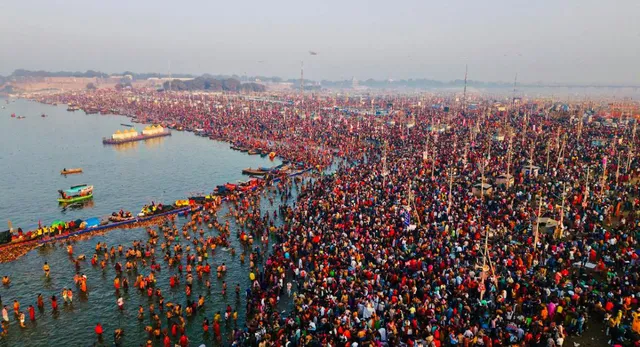- By Kamakshi Bishnoi
- Mon, 17 Feb 2025 10:38 AM (IST)
- Source:JND
The Mahakumbh Mela 2025, which began on January 13, has so far witnessed over 50 crore devotees taking a dip at the holy Sangam, the confluence of the Ganga, Yamuna, and Saraswati rivers. Despite the unprecedented footfall in the area, there have been no reports of hygiene-related issues or the risk of an epidemic.
Union Minister of Space and Atomic Energy, Jitendra Singh, who also took a holy dip in the Triveni Sangam on Sunday, emphasised the crucial role of nuclear technology in ensuring hygiene at the ongoing Maha Kumbh Mela in Prayagraj.
Singh, also serving as the Minister of State in the Prime Minister's Office, highlighted the role of the Hybrid Granular Sequencing Batch Reactor (hgSBR) technology, developed by the Bhabha Atomic Research Centre (BARC) and the Indira Gandhi Centre for Atomic Research (IGCAR). This system utilises specialised microbes to treat sewage efficiently. It ensures that the treated water meets safety standards before being released back into the environment.
READ MORE: BAFTA 2025: Conclave, The Brutalist And Anora Win Big | See Full Winners List
The minister, while talking to NDTV, said three temporary sewage treatment plants employing hgSBR technology were established in Sectors 9, 13 and 15 of the Mela area. Each plant has a treatment capacity of 500 kiloliters per day. There are around 11 permanent sewage treatment plants and three temporary plants that are able to manage wastewater from temporary toilets and drains, alleviating the burden on the city's existing sewage infrastructure.
Besides, the authorities have implemented comprehensive sanitation measures to maintain an open defecation-free environment. Over 1.5 lakh litres of sewage is treated by these plants daily at the mela. The Uttar Pradesh Government has also made 1.5 lakh toilets at the Mela site.
Singh lauded these initiatives as a "Herculean task," made feasible through the integration of indigenous nuclear technologies and meticulous planning. He noted that the collaborative efforts of BARC, IGCAR and other scientific bodies have been instrumental in upholding the sanctity and hygiene of the Maha Kumbh Mela, setting a global benchmark for managing large-scale gatherings.
Along with this, about 200 water dispensing machines have been successfully supplied to provide clean drinking water at the Mahakumbh Mela.
READ MORE: Delhi-NCR Hit By 4.0 Magnitude Earthquake: Why Is National Capital Vulnerable To Quakes?

